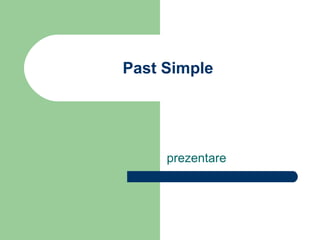
Past Simple Tense Explained
- 1. Past Simple prezentare
- 2. Schema Afirmativ: S + V-ed (pentru verbe regulate) … Sau S + V la forma a IIa (pentru verbe neregulate)… Negativ: S + did + not + V… (didn’t) Interogativ: Did + S + V…?
- 3. verbe regulate verbe neregulate Regula generala spune ca Mai exista si o categorie de un verb la trecut primeste verbe care nu respecta terminatia “-ed”. regula de adaugare a “-ed” la trecut. Ele se numesc “neregulate” si au un cuvant Ex.: play -> played separat pentru a exprima listen -> listened Past Simple. visit -> visited Verbele neregulate se Pentru ca respecta aceasta gasesc in tabele. regula, asemenea verbe se numesc “regulate”
- 4. utilizare Past Simple se foloseste pentru a exprima actiuni trecute, incheiate si care nu se mai pot repeta. Expresii specifice: - Yesterday (ieri) - Last month/year/summer etc (luna/anul/vara…trecut(a)) - In 1987 - In October etc.
- 5. Reguli de scriere la adaugarea terminatiei “-ed” (pentru verbe regulate) 1.Verbele monosilabice terminate in consoana-vocala-consoana dubleaza ultima litera. Ex: stop => stopped; 2. Verbele bisilabice cu accentul pe a doua silaba, terminate in consoana- vocala-consoana, dubleaza ultima litera. Ex: regret => regretted 3. “-e” final mut dispare. Ex: live => lived 4. “-y” final precedat de consoana se transforma in “-i” Ex: try => tried 5. “-l” final se dubleaza. Ex: travel => travelled
- 6. Exemple de propozitii pentru un verb regulat Am incercat sa scriu o carte. I tried to write a book. Afirmativ: S + V-ed (pentru verbe regulate)… N-am incercat sa scriu o carte. Negativ: S + did + not + V… I didn’t try to write a book. (didn’t) Ai incercat sa scrii o carte? Did you try to write a book? Interogativ: Did + S + V…?
- 7. Observatie: Verbele neregulate se gasesc in tabele speciale, sub urmatoarea forma: Ex: to write – wrote – written (forma I/prezent) (forma a II-a) (forma a III-a) to speak – spoke – spoken (forma I/prezent) (forma a II-a) (forma a III-a)
- 8. Exemple de propozitii pentru un verb neregulat Am scris o carte anul trecut. I wrote a book last year. Afirmativ: S + V la forma a IIa (pentru verbe neregulate)… Nu am scris o carte anul trecut. I didn’t write a book last Negativ: S + did + not + V… year. (didn’t) Ai scris o carte anul trecut? Did you write a book last Interogativ: Did + S + V…? year?
- 9. To be (a fi) nu respecta schema lui Past Simple – el are conjugare separata pentru afirmativ, interogativ, negativ. Afirmativ: Interogativ: I was – am fost Was I? – am fost? You were – tu ai fost Were you? – ai fost? He was – el a fost Was he? – el a fost? She was – ea a fost Was she? – ea a fost? It was – el/ea a fost (animale, Was it? – el/ea a fost? lucruri, fenomene) (animale, lucruri, fenomene) We were – noi am fost Were we? – noi am fost? You were – voi ati fost Were you – voi ati fost? They were – ei/ele au fost Were they? – ei/ele au fost?
- 10. To be (a fi) nu respecta schema lui Past Simple – el are conjugare separata pentru afirmativ, interogativ, negativ. Negativ: I was not (I wasn’t) – nu am fost You were not (you weren’t) – nu ai fost He was not (he wasn’t) – el nu a fost She was not (she wasn’t) – ea nu a fost It was not (it wasn’t) – el/ea nu a fost (animale, lucruri, fenomene) We were not (we weren’t) – noi nu am fost You were not (you weren’t) – voi nu ati fost They were not (they weren’t) – ei/ele nu au fost
